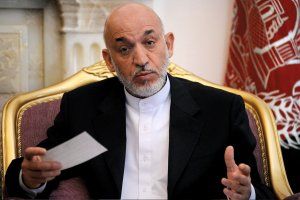
Tehran's influence buyers are on a shopping spree in Kabul. The New York Times only scratched the surface in last week's report that Iranian officials have delivered bags of cash worth millions of dollars to President Hamid Karzai's chief of staff, Umar Daudzai. Karzai confirmed that story but dismissed concerns about corruption, saying the money was spent on "various expenses and helping people." But NEWSWEEK has learned that the practice goes far beyond Karzai's office. In fact, Iranians almost routinely give cash to Afghan officials, parliamentarians, politicians, and religious leaders to promote Tehran's agenda.
Not every high-ranking Afghan condones this habit, of course. A former cabinet minister and another former Afghan official, both asking not to be named speaking about a sensitive topic, tell NEWSWEEK that on an official visit to Tehran in March of last year, then–Afghan foreign minister Rangin Dadfar Spanta (no fan of the U.S.) told Iranian aides how much he admired the long, black chadors that Iranian women wear. As he prepared to leave Tehran, an Iranian Foreign Ministry official handed him a gift-wrapped chador for his wife. Back home, when Spanta and his wife opened the gift, they found that the garment was wrapped around $50,000 in crisp, new bills. Spanta immediately reported the gift to Karzai, suggesting that the cash be returned. Instead, NEWSWEEK's sources say, Karzai told Spanta to remain silent about the cash and not to embarrass the Iranians, advising Spanta to use the money to help fund Foreign Ministry programs. Contacted by NEWSWEEK, Spanta confirmed receiving the $50,000 but would not go into detail beyond saying he turned over the money to the Afghan treasury. Karzai's spokesman Waheed Omer says the president and Spanta "agreed that the money had to go to the Afghan treasury and be spent through the formal channels. It was not spent by anyone personally."
Nearly every encounter between Afghan and Iranian officials ends up with the Iranians proffering a sack of cash, says the former cabinet minister. And with some prominent Afghan politicians belonging to two particular ethnic groups, the Tajiks and the Hazara, Tehran has cultivated relationships that go far deeper than mere money. Iran backed the largely Tajik and Hazara Northern Alliance militia that fought the Taliban in the 1990s, and Iran remains close to those commanders, including Karzai's second vice president, onetime Hazara warlord Karim Khalili (the Pashtuns around Karzai would be the most supportive of America). Well-placed Afghans, including the former minister, say Karzai's cabinet is split between a pro-Iranian faction led by Khalili and a pro-U.S. bloc headed by the finance minister, Omar Zakhilwal. Tehran, however, has the upper hand.
Uncommon Knowledge
Newsweek is committed to challenging conventional wisdom and finding connections in the search for common ground.
Newsweek is committed to challenging conventional wisdom and finding connections in the search for common ground.





